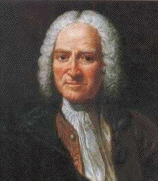December 8: Baron d'Holbach
Baron D'Holbach (1723)
Many men without morals have attacked religion because it was contrary to their inclinations. Many wise men have despised it because it seemed to them ridiculous. Many persons have regarded it with indifference, because they have never felt its true disadvantages. But it is as a citizen that I attack it, because it seems to me harmful to the happiness of the state, hostile to the march of the mind of man, and contrary to sound morality, from which the interests of state policy can never be separated.
—Baron d'Holbach, Christianity Unveiled, quoted in Jim Herrick, Against the Faith, 1985, p. 85.
It was on this date, December 8, 1723, that Paul-Henri Thiry (Baron) d'Holbach was baptized in Edesheim.[1] A German by birth – named Paul Heinrich Dietrich – he was reared in France and, after his farther and uncle died, inherited a large fortune and the Baron's title there. He attended the University of Leyden from 1744 to about 1749 and about this time cast off his religion. "All children are atheists," wrote Holbach, "they have no idea of God."[2]
He was quite popular among the skeptical intellectual elite for his exquisite parties. Many of his guests agreed with Holbach that "If we go back to the beginning we shall find that ignorance and fear created the gods; that fancy, enthusiasm, or deceit adorned or disfigured them; that weakness worships them; that credulity preserves them, and that custom, respect and tyranny support them in order to make the blindness of men serve its own interests."[3]
His guests were a Who's Who of the intellectual West: the Encyclopedist Denis Diderot, the mathematician Jean Le Rond d'Alembert, the historian Edward Gibbon, the writer Horace Walpole, the chemist Joseph Priestley, the social critic Cesare Beccaria, the statesman and scientist Benjamin Franklin, the actor David Garrick, the philosophers Claude-Adrien Helvétius and David Hume, the naturalist Buffon, the economist Adam Smith, the novelist Lawrence Stern, and Jean-Jacques Rousseau. When he was not entertaining, he was writing, articles on chemistry and mineralogy for the French Encyclopedia, in which he collaborated with Rosseau. Rousseau is said to have based his "virtuous Atheist," Wolmar, in his Nouvelle Héloïse, on the real-life virtuous Atheist.
Holbach also wrote, under a pseudonym, the first openly atheistic works in modern history. These include his most famous materialistic work, which had to be published first in London, System of Nature (Système de la Nature, 1770), which had great influence on his contemporaries. For that reason, Holbach is considered one of the most radical philosophers of the Enlightenment.
Holbach's System of Nature included this argument against God:
If God wishes to be known, to be loved, to be thanked ... why not manifest himself to the whole earth in an unequivocal manner...? ... In place of so many miracles ... could not the lord of the spirits convince the human mind in an instant of the thing he wants known to it? Instead of suspending a sun in the vault of the firmament, instead of orderlessly scattering the stars and the constellations which fill space, would it not have been more consistent with the picture of a God so jealous of his glory and so well disposed toward men to write in a manner not subject to dispute, his name, his attributes, his immutable will in ineffaceable characters, readable equally by all the inhabitants of the world? No one then would have been able to doubt the existence of God, his clear will, or his visible intentions. ...
In effect, even if we admit the existence of the God of theology and the reality of the conflicting attributes which we give him, we could not conclude anything therefrom to authorize the conduct or the worship with which we are enjoined to requite him. ... If he is infinitely good, what reason would we have to fear him? If he is infinitely wise, why should we be anxious about our fate? If he knows everything, why inform him of our needs and weary him with our prayers? If he is everywhere, why build temples to him? If he is the master of everything, why make him sacrifices and offerings? If he is just, why fear that he will punish creatures he has filled with weakness? ... If he is all-powerful, how offend him, how resist him? ... If he is immutable, by what right do we presume to say that his decrees are changed? If he is inconceivable, why concern ourselves about him? If he has spoken, why is not the universe convinced?[4]
Holbach died on 21 January 1789. It was Baron D'Holbach who said, "If the ignorance of nature gave birth to gods, the knowledge of nature is calculated to destroy them."[5]
[1] Few sources agree on Holbach's date of birth. It is recorded that he was baptized on 8 December 1723, so that is the date used here.
[2] Baron d'Holbach, Good Sense, 1772.
[3] Baron d'Holbach, Système de la nature (System of Nature), 2 vols., London, 1770.
[4] Baron d'Holbach, ibid., translation by E.F. Bennett. An English translation of Holbach's System of Nature can be found through the Project Gutenberg site at this link. Parts of the quote were revived by Shelley in “The Necessity of Atheism” (1811).
[5] Baron d'Holbach, ibid.
Originally published December 2003 by Ronald Bruce Meyer.


